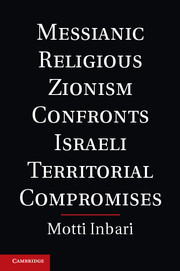Description
Messianic Religious Zionism Confronts Israeli Territorial Compromises
Author: Inbari Motti
The book discusses the ways in which the rabbinical elite of the Israeli West Bank settlers responded to Israeli territorial compromises.
Language: English
Subject for Messianic Religious Zionism Confronts Israeli...:
Approximative price 90.29 €
In Print (Delivery period: 14 days).
Add to cart
Messianic Religious Zionism Confronts Israeli Territorial Compromises
Publication date: 08-2012
211 p. · 16.2x24 cm · Hardback
Publication date: 08-2012
211 p. · 16.2x24 cm · Hardback
Approximative price 30.28 €
In Print (Delivery period: 14 days).
Add to cart
Messianic Religious Zionism Confronts Israeli Territorial Compromises
Publication date: 07-2014
Support: Print on demand
Publication date: 07-2014
Support: Print on demand
Description
/li>Contents
/li>Biography
/li>
The Six Day War in 1967 profoundly influenced how an increasing number of religious Zionists saw Israeli victory as the manifestation of God's desire to redeem God's people. Thousands of religious Israelis joined the Gush Emunim movement in 1974 to create settlements in territories occupied in the war. However, over time, the Israeli government decided to return territory to Palestinian or Arab control. This was perceived among religious Zionist circles as a violation of God's order. The peak of this process came with the Disengagement Plan in 2005, in which Israel demolished all the settlements in the Gaza Strip and four settlements in the West Bank. This process raised difficult theological questions among religious Zionists. This book explores the internal mechanism applied by a group of religious Zionist rabbis in response to their profound disillusionment with the state, reflected in an increase in religious radicalization due to the need to cope with the feelings of religious and messianic failure.
1. Zionist perceptions in the thought of Rabbi Zvi Yehuda Kook and the roots of Gush Emunim; 2. Gush Emunim and the Israeli-Egyptian peace agreement; 3. The statist approach confronted with the Oslo Accords; 4. 'Hearing a baby's cry': political reality and messianic retreat in the thought of Rabbi Yehuda Amital; 5. Post-Zionism in the religious-Zionist camp: the 'Jewish leadership' movement; 6. Fundamentalism in crisis: the response of messianic religious Zionism to the theological dilemmas raised by Israel's disengagement plan; 7. The position of the messianic religious Zionist rabbis to political violence and incitement; 8. The American fundamentalist response to 'land for peace' solutions.
Mordechai ('Motti') Inbari is the author of Jewish Fundamentalism and the Temple Mount: Who Will Build the Third Temple?, which won the American-Israeli Cooperative Enterprise Best Publication Award in Israel Studies (2008) and the Ben Shemesh Best Dissertation Award for the Study of Zionism and the State of Israel (2007). His work has appeared in Israel Studies, Hebrew Union College Annual, Nova Religio, Modern Judaism, Journal of Church and State and Studies in Contemporary Jewry. Prior to his appointment at the University of North Carolina, Pembroke, he served as a Post-Doctoral Associate at the Schusterman Center for Israel Studies at Brandeis University.
© 2024 LAVOISIER S.A.S.




